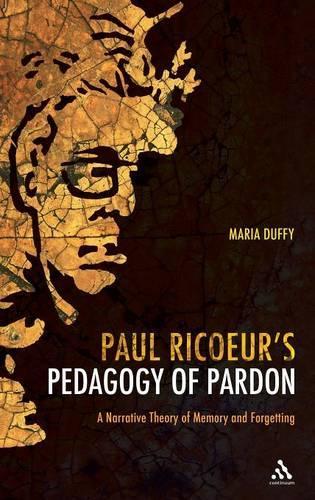
Paul Ricoeur's Pedagogy of Pardon: A Narrative Theory of Memory and Forgetting
(Hardback)
Available Formats
Publishing Details
Paul Ricoeur's Pedagogy of Pardon: A Narrative Theory of Memory and Forgetting
By (Author) Dr Maria Duffy
Bloomsbury Publishing PLC
Continuum International Publishing Group Ltd.
23rd April 2009
United Kingdom
Classifications
Tertiary Education
Non Fiction
Ethics and moral philosophy
Philosophy of religion
194
Physical Properties
Hardback
208
Width 156mm, Height 234mm
Description
Maria Duffy describes Paul Ricoeur's narrative theory of memory and addresses central conceptual and methodological issues in his theory of forgiveness and reconciliation. As the many Truth Commissions around the world illustrate, revisiting the past has a positive benefit in steering history in a new direction after protracted violence.
A second deeper strand in the book is the connection between Ricoeur and John Paul II. Both lived through the worst period of modern European history (Ricoeur a prisoner of war during WWII and John Paul, who suffered under the communist regime). Both have written on themes of memory and identity and share a mutual concern for the future of Europe and the preservation of the Christian' identity of the Continent as well as the promotion of peace and a civilization of love. The book brings together their shared vision, culminating in the award to Ricoeur by John Paul II of the Paul VI medal for theology.
Reviews
"I find Duffy's conception of Ricoeur's narrative pedagogy of pardon' - complete with a narrative arc of memory - brilliant in capturing but also applying Ricoeur's enduring contribution to a world broken by war and violence." Dr Pamela Sue Anderson, Reader in Philosophy of Religion, University of Oxford, UK
Duffy's admirable presentation of the hermeneutical arc and the relationship to reconciliation and hope present a valuable opportunity for inter-disciplinary exploration of commencement through the works of Arendt. -- Solomon Davis, Skagit Valley College * Pacific Review *
Duffys work... provides a clearly written discussion of Ricoeurs narrative theory and its impact on our understanding of memory, reconciliation, and ethics... By tone and argument, her intention is not to provide a critical evaluation of Ricoeurs philosophy, but rather persuade the reader to apply Ricoeurs thought to contemporary theological treatments of peace and justice. As such, this work would be useful for theologians working on issues of conflict, religion, and politics. -- Forrest Clingerman, Ohio Northern University * Religious Studies Review *
Author Bio
Dr. Maria Duffy teaches in the Department of Moral Theology and Canon Law, Milltown Institute Philosophy and Theology, Milltown Park, Dublin 6. Ireland.
